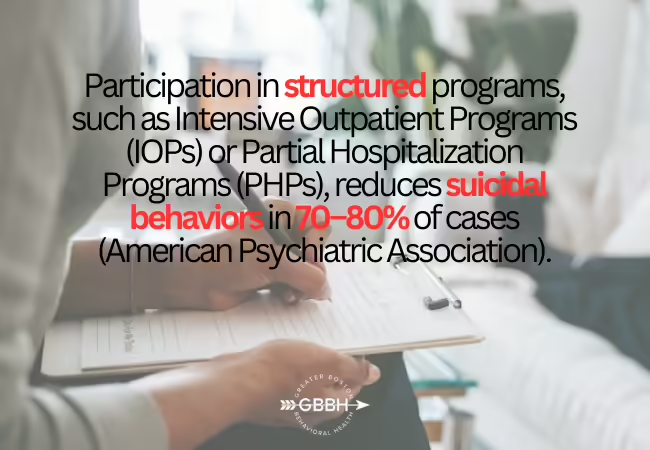An attempted suicide is a life-altering event that profoundly affects both the individual and their loved ones. While surviving an attempt may feel overwhelming, it marks an opportunity for intervention, healing, and rebuilding hope. The journey to recovery requires understanding, compassion, and access to professional care to address the underlying causes of suicidal ideation and support long-term well-being.
If you or a loved one is facing this challenge, programs such as an Anxiety Treatment Program, Depression Treatment Program, and structured care at a Mental Health Treatment Center in Boston can provide the guidance and support needed for recovery.
Understanding Suicide Attempts
Suicide attempts are not a sign of weakness or selfishness but an indicator of intense emotional pain and a desire to escape overwhelming feelings. Understanding the factors that contribute to suicidal thoughts and actions is critical for fostering compassion and providing effective support.
1. Common Triggers for Suicide Attempts
- Mental Health Disorders: Conditions such as depression, anxiety, PTSD, and bipolar disorder often underlie suicidal ideation.
- Life Stressors: Financial struggles, career challenges, relationship conflicts, and significant losses can exacerbate feelings of hopelessness.
- Trauma: Survivors of abuse, neglect, or violence may feel unable to escape the emotional pain of their experiences.
- Social Isolation: A lack of strong social connections often leads to loneliness, a common factor in suicide attempts.
2. The Importance of Recognizing Warning Signs
- Expressions of hopelessness or feeling like a burden to others.
- Sudden withdrawal from loved ones or social activities.
- Risk-taking behaviors or increased use of alcohol and drugs.
- Giving away possessions or making comments about “saying goodbye.”
Understanding these signs can help loved ones intervene before a crisis occurs.
What to Do After an Attempted Suicide
An attempted suicide requires immediate care and long-term support. Here are the essential steps to take after such an event:
1. Ensure Immediate Medical Attention
- Address physical injuries or complications resulting from the attempt.
- Seek crisis intervention through emergency services or hotlines such as the National Suicide Prevention Lifeline at 988.
2. Engage Professional Mental Health Services
- Work with professionals to assess the underlying causes of suicidal thoughts.
- Explore structured programs like an Intensive Outpatient Program (IOP) or a Partial Hospitalization Program (PHP) for focused care.
- Therapies such as Trauma Therapy Programs can address the root causes of emotional pain and teach coping mechanisms.
3. Create a Safe and Supportive Environment
- Remove potentially harmful items or substances from the individual’s surroundings.
- Encourage open communication without judgment or pressure to “move on.”
- Establish a daily routine that includes moments of connection and reflection.
The Role of Professional Support in Recovery
Professional care is essential for addressing the complex factors underlying suicidal ideation and fostering long-term recovery. Trained mental health professionals provide the tools, strategies, and guidance necessary to navigate the healing process.
1. Evidence-Based Therapies
- Cognitive-Behavioral Therapy (CBT): Helps individuals identify and reframe negative thought patterns contributing to suicidal ideation.
- Dialectical Behavior Therapy (DBT): Focuses on improving emotional regulation, distress tolerance, and interpersonal skills.
- Trauma Therapy Programs: Address unresolved trauma that may fuel suicidal thoughts or behaviors.
2. Comprehensive Mental Health Programs
- Anxiety and Depression Treatment Programs: These programs address co-occurring conditions that often accompany suicidal ideation.
- Group Therapy Programs: Create a sense of community and shared understanding, reducing feelings of isolation.
- Family Therapy Programs: Foster communication and healing among loved ones, creating a stronger support network.
3. Structured Care Options
- Intensive Outpatient Programs (IOPs): Provide therapeutic sessions several times a week, offering flexibility and support for those returning to daily life.
- Partial Hospitalization Programs (PHPs): Deliver intensive, daily therapeutic interventions for individuals needing focused care and supervision.
Supporting a Loved One After an Attempt
Caring for a loved one after a suicide attempt is a challenging but critical role. Your support can be a lifeline, providing the stability and compassion they need to recover. While it may feel overwhelming, understanding how to approach the situation with empathy and patience can make a meaningful difference in their healing journey.
1. Approach with Empathy and Understanding
- Validate Their Feelings: Let them know their emotions are valid, and avoid dismissing their experiences. Phrases like “I’m here for you” or “You’re not alone” can help foster a sense of safety.
- Avoid Judgment: Refrain from asking “why” they attempted suicide, which may feel accusatory. Instead, focus on what they need now to feel supported.
- Listen Actively: Encourage open conversations without interrupting or offering quick solutions. Sometimes, simply being a nonjudgmental listener is the most effective form of support.
2. Create a Safe and Supportive Environment
- Remove Harmful Items: Ensure their living space is free of potentially dangerous objects, such as sharp tools, firearms, or substances that could be used in a future attempt.
- Foster a Calm Atmosphere: Keep their environment as stress-free as possible, offering a quiet and supportive space where they feel secure.
- Respect Their Boundaries: While it’s important to be available, avoid being overbearing. Give them the space to process their emotions at their own pace.
3. Encourage Professional Help
- Connect Them with Resources: Research local options, such as a Mental Health Treatment Center in Boston, and help them navigate the process of accessing care.
- Offer to Attend Appointments: Accompanying them to therapy or support group meetings can reduce anxiety and provide reassurance.
- Explore Structured Programs: Programs such as Intensive Outpatient Programs (IOPs) or Partial Hospitalization Programs (PHPs) offer comprehensive support while allowing flexibility.
4. Build a Strong Support System
- Engage Trusted Individuals: Involve other supportive friends or family members who can help share the responsibility of care.
- Utilize Family Therapy Programs: Rebuild trust and improve communication within the family, creating a unified support network.
- Promote Social Connections: Encourage participation in Group Therapy Programs to reduce isolation and foster a sense of community.
5. Educate Yourself About Suicide and Mental Health
- Understanding the underlying causes of suicidal ideation, such as anxiety, depression, or trauma, can help you approach your loved one with greater sensitivity.
- Learn the warning signs of a potential crisis, such as sudden mood changes, withdrawal, or expressions of hopelessness.
Preventing Future Crises
While recovery from a suicide attempt involves addressing the immediate crisis, preventing future episodes requires ongoing care, lifestyle adjustments, and proactive planning. Creating a foundation of emotional resilience and support can significantly reduce the risk of recurrence.
1. Develop a Personalized Safety Plan
- Collaborate with Professionals: Work with a therapist to create a crisis plan that includes coping strategies, emergency contacts, and steps to take if suicidal thoughts resurface.
- Identify Triggers: Help them recognize situations, thoughts, or environments that may lead to emotional distress.
- List Emergency Resources: Ensure they have access to hotline numbers, such as the National Suicide Prevention Lifeline (988), and contact information for their therapist or support team.
2. Foster Healthy Coping Mechanisms
- Encourage Mindfulness Practices: Activities like meditation, deep breathing, or yoga can help them manage stress and stay present.
- Promote Physical Activity: Regular exercise, such as walking or swimming, improves mood and reduces anxiety.
- Explore Creative Outlets: Suggest hobbies like writing, painting, or playing music as ways to channel emotions constructively.
3. Address Underlying Mental Health Conditions
- Engage in Ongoing Therapy: Long-term care through Anxiety Treatment Programs or Depression Treatment Programs can address the root causes of suicidal ideation.
- Trauma Therapy Programs: For those with a history of abuse or significant loss, trauma-focused care helps process and heal emotional wounds.
- Medication Management: If prescribed, ensure they adhere to their medication plan and attend follow-ups with their psychiatrist.
4. Strengthen Their Support Network
- Build Community Connections: Encourage participation in local groups or activities to reduce isolation.
- Check in Regularly: Consistent, genuine communication helps them feel valued and supported.
- Involve Family and Friends: A strong support system of loved ones can provide encouragement and accountability.
5. Promote a Balanced Lifestyle
- Establish a Routine: A predictable daily schedule provides structure and stability, reducing feelings of chaos or uncertainty.
- Encourage Restful Sleep: Create habits that promote better sleep, such as reducing screen time before bed and maintaining a consistent bedtime.
- Focus on Nutrition: A healthy diet supports both physical and emotional health, enhancing their overall well-being.
6. Monitor Progress and Be Patient
- Recovery is a gradual process, and setbacks are normal. Celebrate small victories and remain patient during challenging moments.
- Stay attuned to changes in mood or behavior and address concerns promptly by reaching out to their care team.
How Greater Boston Behavioral Health Can Help
At Greater Boston Behavioral Health, we specialize in providing compassionate and comprehensive care for individuals recovering from suicide attempts. Our evidence-based programs focus on addressing the root causes of distress and empowering individuals to rebuild their lives.
Our Services Include:
- Anxiety and Depression Treatment Programs: Tailored care for individuals managing mental health conditions.
- Trauma Therapy Programs: Focused interventions to address past experiences and emotional wounds.
- Family Therapy Programs: Tools to rebuild trust and foster understanding within families.
- Group Therapy Programs: Opportunities to connect with others in similar situations.
- Intensive Outpatient Programs (IOPs) and Partial Hospitalization Programs (PHPs): Structured, supportive care for those needing focused attention.
Final Thoughts
Supporting a loved one after a suicide attempt and preventing future crises are acts of compassion, dedication, and resilience. By fostering open communication, building a strong support network, and encouraging professional care, you can help your loved one navigate their journey toward healing and hope.
If you or someone you know is navigating this journey, Greater Boston Behavioral Health is here to help. Contact us today at (888)278-0716 to learn more about our programs and start the path toward healing and recovery.
FAQs on Help After an Attempted Suicide
What should I do immediately after an attempted suicide?
Seek immediate medical attention to address physical injuries and contact mental health professionals for crisis intervention. Call the National Suicide Prevention Lifeline at 988 for immediate support.
How can I support someone after an attempted suicide?
- Create a safe and nonjudgmental space for open communication.
- Remove harmful objects or substances from their environment.
- Encourage them to seek professional help through therapy or structured programs.
What treatment options are available after a suicide attempt?
- Intensive Outpatient Programs (IOPs) and Partial Hospitalization Programs (PHPs) provide structured support.
- Trauma Therapy Programs address underlying causes of emotional distress.
- Family and Group Therapy Programs foster connection and understanding.
What role does professional therapy play in recovery?
Therapy offers tools to manage emotions, build resilience, and address the root causes of suicidal ideation. Evidence-based approaches like Cognitive-Behavioral Therapy (CBT) and Dialectical Behavior Therapy (DBT) are highly effective.
Can suicidal thoughts return after an attempt?
Yes, suicidal thoughts may resurface if underlying issues are not addressed. Ongoing support through therapy and a strong support network can reduce the risk of future crises.
How can families help after an attempted suicide?
Families can participate in Family Therapy Programs to rebuild trust, improve communication, and create a supportive environment. They should educate themselves about mental health to better understand and assist their loved one.


